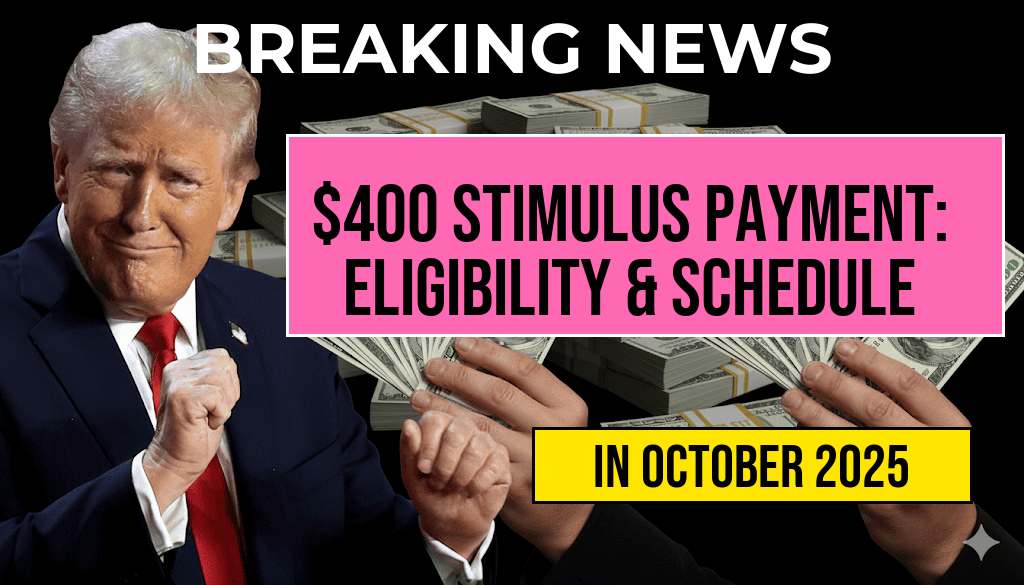A new federal stimulus initiative is providing $400 payments to eligible individuals across the United States, aiming to offer financial relief amid ongoing economic challenges. The program, announced by the Department of Treasury, is designed to reach a broad segment of the population, with specific eligibility criteria that focus on income levels, employment status, and recent tax filings. Payments are scheduled to be distributed over the upcoming months, with detailed timelines available for applicants. This initiative seeks to support households facing increased expenses and economic uncertainty, supplementing existing relief measures. Eligible recipients can expect straightforward application processes, with funds delivered directly via direct deposit or prepaid debit cards. This article outlines the key eligibility requirements, the complete payment schedule, and how individuals can ensure they receive their stimulus payments promptly.
Who Qualifies for the $400 Stimulus Payment?
Eligibility Criteria Overview
The program is designed to assist a wide range of Americans, emphasizing those most impacted by recent economic shifts. To qualify, applicants must meet several core requirements:
- Have a valid Social Security number and be a U.S. citizen or qualifying resident.
- Demonstrate an income below the specified threshold—generally, households earning less than $75,000 annually for individuals, with increased thresholds for married couples and families.
- Be employed or unemployed, with the stipulation that applicants must have filed a 2022 tax return or have a valid IRS record of recent income.
- Not be claimed as a dependent on another taxpayer’s return.
Some categories, such as seniors receiving Social Security benefits or individuals with disabilities, are eligible without additional income verification, provided they meet basic residency and identification requirements.
Additional Considerations
Applicants who recently filed their taxes or updated their IRS information are encouraged to ensure their records are current to facilitate a smooth disbursement process. Non-filers can still qualify by submitting a simplified application through designated channels, which are outlined on the IRS website (irs.gov).
Complete Payment Schedule and Distribution Timeline
Distribution Phases
The payments are scheduled to roll out in phased intervals, based on filing status and the last digit of the applicant’s Social Security number. The schedule is designed to ensure equitable distribution across different demographic groups and minimize processing delays.
| Payment Phase | Start Date | End Date | Eligibility Requirements |
|---|---|---|---|
| Phase 1 | April 15, 2024 | April 30, 2024 | Tax filers with SSN ending in 0 or 1 |
| Phase 2 | May 1, 2024 | May 15, 2024 | SSN ending in 2 or 3 |
| Phase 3 | May 16, 2024 | May 31, 2024 | SSN ending in 4 or 5 |
| Subsequent Phases | June 1, 2024 | June 15, 2024 | Remaining SSN endings and non-filers |
Method of Payment
Eligible recipients will receive their $400 stimulus payments either through direct deposit—if banking information has been provided to the IRS—or via prepaid debit cards sent through the mail. The IRS recommends verifying contact details early to prevent delays.
Application Process and How to Ensure Receipt
Applying for the Payment
Most eligible individuals will automatically receive their payments if they filed a 2022 tax return or are registered with the IRS’s non-filer portal. For those who did not file taxes or recently moved, an expedited application form is available on the IRS website (irs.gov).
Important Tips for Recipients
- Update your banking information with the IRS to facilitate direct deposit.
- Monitor the IRS’s newsroom for official updates on payment schedules.
- Be cautious of scams—official communications will not request personal information via email or phone.
Additional Resources and Support
For comprehensive guidance on eligibility and application procedures, visit the IRS official website or consult reputable financial news sources like Forbes (forbes.com) for ongoing updates. The IRS also provides a dedicated helpline to assist with questions related to stimulus payments and filing issues.
This initiative underscores the federal government’s effort to provide targeted financial support during a period of economic uncertainty. Eligible individuals should review their circumstances carefully and act promptly to ensure they receive their $400 stimulus payment.
Frequently Asked Questions
Question
Who is eligible to receive the $400 stimulus payment?
Answer
Individuals who meet the eligibility requirements outlined in the article, including specific income thresholds and filing status, are eligible to receive the $400 stimulus payment.
Question
What are the eligibility requirements for the $400 stimulus payment?
Answer
The eligibility requirements include being a tax filer with a valid Social Security number, having a modified adjusted gross income (MAGI) below a certain threshold, and meeting other criteria specified in the article.
Question
When is the complete payment schedule for the $400 stimulus expected to occur?
Answer
The payment schedule is detailed in the article, with disbursements planned over specific dates, starting from the initial payment date and continuing through the upcoming months.
Question
Are joint filers eligible for the $400 stimulus payment?
Answer
Yes, joint filers who meet the eligibility criteria are eligible to receive the $400 stimulus payment, with the amount typically split or combined based on filing status.
Question
How can I check the status of my stimulus payment?
Answer
You can check the status of your stimulus payment using the official IRS Get My Payment tool or by following the instructions provided in the article for tracking disbursements.





